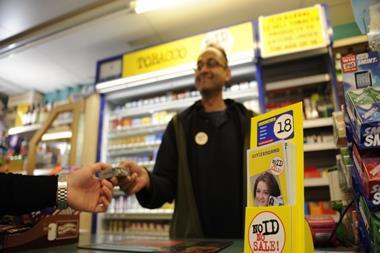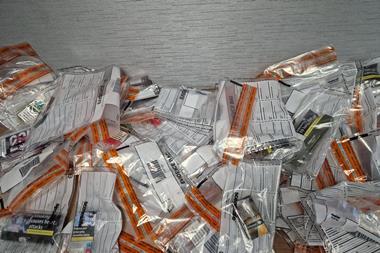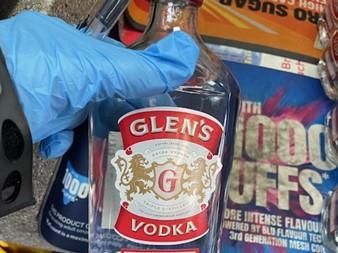Tough new penalties combined with new ways of working and increased enforcement action expected this summer mean that it has never been so important for independent retailers to stop underage sales in their tracks
Convenience store retailers are certainly no strangers to the front line. From complying with the tobacco display ban to meeting food labelling rules, every day stores fight to uphold new government legislation as well as face up to conflict, crime and confusion.
Convenience store retailers also act as the first line of defence against underage sales - with responsible retailers helping to prevent age-restricted products such as alcohol and tobacco passing into the wrong hands.
However, while the industry is working hard to stem the supply of age-restricted goods to under-age people, more still needs to be done. About 11% of retail premises currently fail council test purchasing exercises, according to the Trading Standards Institute’s Tobacco Control Survey for England in 2013/14 - and remember that the vast majority of official test purchases are conducted using children aged 17 and under.
The figure is worse for independent test purchasing exercises - with about 50% of test purchases carried out by training provider Underage Sales resulting in a sale.
However, it’s important to note that these unofficial test purchases can only be carried out using volunteers of 18 and over - meaning that the exercise is testing a store’s “challenge culture” rather than legality.
AGE restrictions
Tobacco: 18
Electronic cigarettes: 18 from October 1 2015
Alcohol: 18
Lighter fuel: 18
Knives: 18
Fireworks: 16/18 depending on what category they fall under
Lottery: 16
Liqueur chocolates: 16
And right now it’s never been so important for retailers to follow the rules. Efforts to combat underage sales are set to come under even greater scrutiny this year as councils step up test purchasing exercises in the wake of the tobacco display ban, and a particularly strong wave of tests and enforcement action is expected to hit during the school holidays.
Customer service and stock-keeping are not the only implications of the new tobacco display ban. It has also totally changed the way in which many convenience store retailers police underage sales.
The new law has made it illegal for any section of the gantry to be opened at the request of someone under the age of 18, meaning that staff and store owners must carry out ID checks on anyone suspected of being under age BEFORE they open the gantry to retrieve tobacco products. The change means that key barriers such as age-verification till prompts have been rendered all but useless, as it’s now an offence to simply show tobacco to someone under the age of 18, let alone sell it.
Tony Allen, MD of training company Underage Sales, elaborates: “Before the ban, retailers and staff had quite a lot of thinking time before making or refusing a tobacco sale. They had to find the product on the gantry, put it through the till and in many cases, past a till prompt first. The display ban has changed all that - effectively there is no more thinking time in a dark market environment. As soon as anyone who might be underage asks for tobacco an ID check has to be carried out.”
And, of course, tobacco isn’t the only age-restricted product that retailers have to police. Alcohol, National Lottery tickets, fireworks, solvents and, from October 1 this year, electronic cigarettes all have their own age restrictions.
Riding alongside the threat of increased enforcement action around underage sales is the fact that the penalty for making selling other age-restricted products (excluding tobacco) is now limitless. The previous £5,000 upper limit was scrapped in England and Wales in March.
The change requires retailers to maintain watertight underage sales prevention techniques at all times, the Association of Convenience Stores says.
Allen agrees. “If a retailer is caught selling age-restricted products such as alcohol and scratchcards to children, magistrates now have to include a punitive element to the sentence, and are no longer constrained to maximum penalties. Other factors such as the turnover of the business can now be taken into consideration during sentencing, which could result in retailers being hit with seriously damaging punishments,” he says.
A robust underage sales policy such as Challenge 25, combined with a structured training programme, is clearly one of the best defences against underage sales.
However, in Allen’s experience about half of c-store retailers do not have a structured training programme on underage sales prevention. “Many retailers will have just carried out verbal training with their staff and won’t have kept any record of it,” he says.
The ACS recommends that underage sales induction training should involve at least one full hour of directly supervised customer service with the store owner or another experienced staff member, to be followed by a question and answer exercise.
Formal refresher training using simple question and answer sheets should also be carried out at least every six months, alongside more informal sessions, the ACS recommends. Question and answer sheets for both induction and refresher training are available to download from www.acs.org.uk/underagesales.
Other options include the Trading Standards Institute’s online course launched earlier this year in partnership with Virtual College. The ‘Prevention of Underage Sales’ course uses a variety of scenarios and an assessment to test and log levels of understanding.
Retailers can also consider additional training such as the Award for Personal Licence Holders (specifically for alcohol) and there are also other qualifications available accredited to the National Vocational Qualification (NVQ) standard.
The 2015 Responsible Retailing Award winners Samantha and Mark Coldbeck of Wharfedale Premier Stores in Hull operate a Challenge 25 policy and use a web-based training programme for staff, while extra barriers such as till prompts for alcohol and other age-restricted products help to ensure that nothing slips through the net.
The store’s policy on underage sales is also prominently displayed in the staff room, where it acts as a constant reminder. The pair also employ Serve Legal to carry out regular test purchasing exercises.
Spar retailer Susan Connolly from Wiltshire prides herself on her underage sales policy, and in fact welcomes the increased penalties for retailers found guilty of making unlawful sales. “Underage sales happen too frequently in certain areas and stores. We refresh our members of staff each month and they all have to take a compulsory age-related training course once a year.”
Independent retailer Manny Patel from Manny’s in Long Ditton has devised his own underage sales training package which all members of staff are required to learn and understand before they are allowed on till.
“I also have a good relationship with my local trading standards officers and have shown them the manual so they know it’s something I take very seriously,” he adds.
Independent retailer Nigel Dowdney, who owns two stores in Earlham and Stalham, Norfolk, also employs a 25 policy and when it comes to training uses printed manuals from his local council. “All new starters are given a thorough induction process using these materials, and staff training is refreshed every three months in an informal setting where we go through all the key points again.
“Crucially, we also give staff the opportunity to ask us questions or air any concerns, which really helps to maintain standards. It is also important to help boost staff confidence, especially when it comes to avoiding and dealing with confrontation,” Nigel adds.
Record-keeping is also key and can help to demonstrate the actions you take to prevent underage sales - something which, according to the ACS, “can prove invaluable should the police, trading standards or licensing officers come to check compliance”.
The ACS recommends that retailers keep a written record of which store policy on preventing underage sales they operate, such as Challenge 25, and the training, including all dates, that each member of staff undertakes. This record should also be signed by the employee after every training session.
Nigel does just this. At the end of every training session, he ensures that each member of staff signs a document to say that they understand their responsibilities and what they have been taught.
In the unlikely event that either of his stores fail a test purchase, Nigel could use the training records to show he had done everything in his power to prevent underage sales from taking place. “I’m also lucky that I have a good relationship with my local trading standards officer and can go to them for advice,” he adds.
It’s also vital that retailers and staff record each time a sale is refused for failure to provide valid identification or under the suspicion the product was being bought as part of a proxy purchase.
“Most retailers keep a book or folder for this purpose. However, some integrate it into their epos. This is fine, as long as you can generate reports if you have an inspection,” the ACS Assured Advice continues.
Proof that the introduction of structured and professional training on underage sales reaps immediate benefits can be found in the results of an exercise conducted by JTI in partnership with Serve Legal.
The £400,000 programme, which used 18-year-old volunteers to test the “challenge culture” of 2,500 independent stores in the North West, led to a 7% rise in the number of retailers requesting ID.
Stores which were identified as being “at risk” of failing a genuine underage test purchase were offered free specialist training including tips on how to challenge for ID and checking its validity.
But, of course, it’s not just inexperienced members of staff or irresponsible retailers who can fall foul - life-long dedicated convenience operators have been known to get caught out. With tough new laws and penalties to contend with, as well as the industry’s reputation to safeguard, now is not the time to let guards slip.
SIGNAGE
Make the message clear
The display of correct and professional restricted POS material and signage can also help to reinforce the barriers against underage sales. Symbol groups, wholesalers, tobacco companies and training providers such as Underage Sales can provide a range of material including window stickers and posters. A variety of posters and shelf-edge labels are also available to download and print from the ACS website, www.acs.org.uk/underagesales.
Signage doesn’t just act as a deterrent for underage customers, it can also play a vital role in reducing conflict at the till should an adult customer be asked for ID, and crucially it helps to keep the issue front of mind for staff.
The Date of Birth poster from Underage Sales, for example, is designed to be kept in staff areas to help employees work out quickly if a customer is of the legal age when shown ID.

















![Muller_Bliss_Whipped_Elevated_Lemon_Meringue_Pie_FF[87]](https://d2dyh47stel7w4.cloudfront.net/Pictures/100x67/2/2/2/352222_muller_bliss_whipped_elevated_lemon_meringue_pie_ff87_462652_crop.jpg)























No comments yet